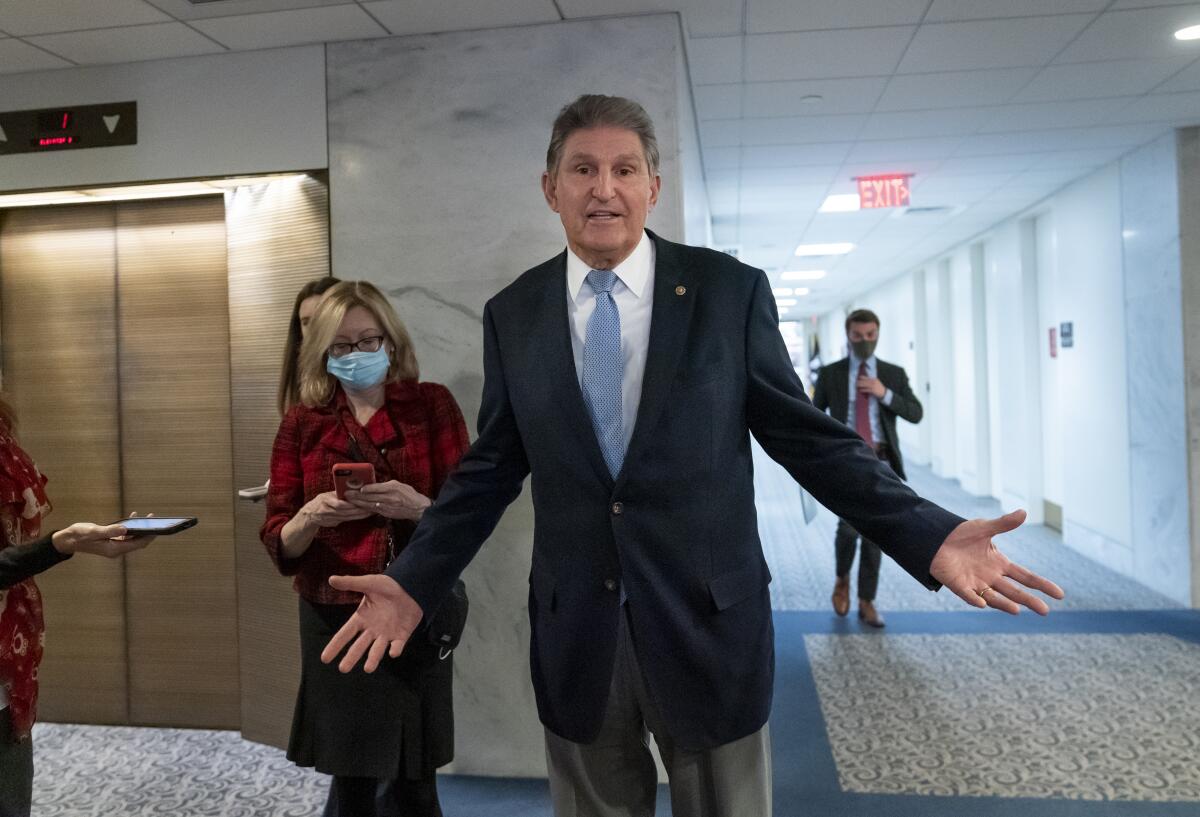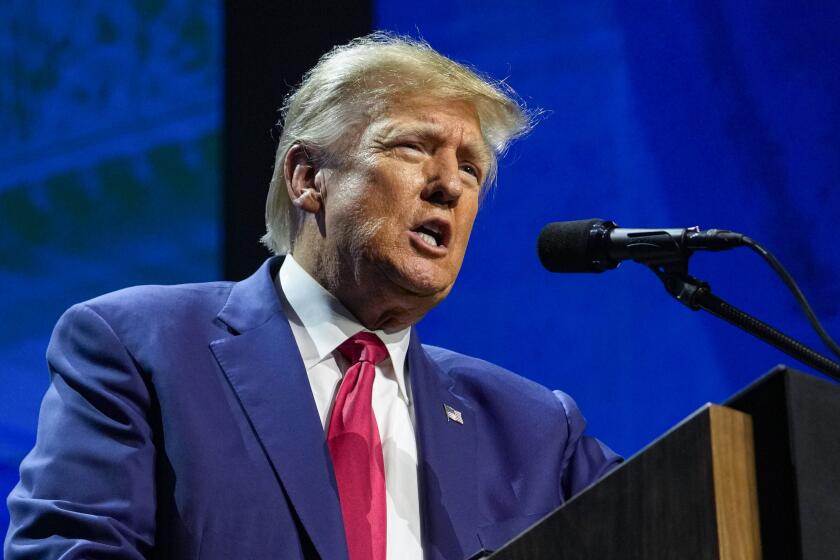Column: A centrist, third-party alternative for 2024 is a nice idea — but a nightmare in practice

- Share via
Many Democrats are gloating that Ron DeSantis is flailing. If they agree with President Biden that former President Trump is a threat to Democracy, shouldn’t they be rooting for an alternative?
WASHINGTON — Now that the presidential campaign is underway, that low moan you hear is the sound of voters contemplating their likely fate: a choice between two elderly retreads, President Biden and former President Trump.
Last week’s NBC News poll confirmed a consensus: Hardly anyone is yearning for this rematch. A whopping 70% of Americans don’t want Biden to run, including 51% of Democrats. Almost as many, 60%, don’t want Trump to run, including about a third of Republicans.
But Americans are inventive. Can’t some political entrepreneur find a way out of this dilemma?
Enter the Washington-based group No Labels, which has done admirable work promoting bipartisan cooperation in Congress.
Its leaders say they’ve been mortally disappointed by Biden and Trump, and they’re determined to offer a third-party alternative.
In 2016, Trump pledged “to be a break from the stale version of conservatism that had previously dominated the GOP,” the group’s founder, former Democratic fundraiser Nancy Jacobson, wrote last year. Likewise, in 2020, Biden vowed “to steer Democrats away from their activist base toward unity.”
Yet “both presidents ended up caving largely to their supporters on the various extremes,” she said.
Jacobson’s big idea is to put a new party on the ballot and nominate a bipartisan ticket chosen from the center, such as Sen. Joe Manchin III, a West Virginia Democrat, and former Gov. Larry Hogan, a Maryland Republican — both of whom have talked with No Labels and haven’t ruled out running.
Jacobson, who once worked for Bill Clinton and Al Gore, says she hopes to raise $70 million and get a ticket on the ballot in all 50 states. No Labels has already qualified as a party in Arizona, Colorado, Oregon and Alaska.
In a three-way race, she noted, a candidate doesn’t need a majority to win a state’s electoral votes. “All you need is 34%,” she said.
“This is a unique American moment,” she told me last week. “Can you imagine a Democrat and a Republican walking arm-in-arm down Pennsylvania Avenue?”
It’s an appealing picture, even if the strolling heroes are the not-quite-charismatic Manchin and Hogan. What could go wrong?
Plenty, worried Democrats warn.
For one thing, history strongly suggests that a third party can’t win — as in, it’s never happened. The closest anyone has ever come was Theodore Roosevelt in 1912, with 27%. The unintended result: He split the Republican vote and delivered the White House to Democrat Woodrow Wilson. More recently, Ross Perot managed to win 19% in 1992. Nobody else has come close. The lesson: 34% is harder than it looks.
That means a third-party ticket would almost surely be a spoiler, taking just enough votes from one of the two major-party candidates to tip the outcome. That’s arguably what happened in 2000, when Gore lost the decisive state of Florida to George W. Bush by 537 votes. (Ralph Nader was a third-party candidate.) And in 2016, when Hillary Clinton lost Michigan, Wisconsin and Pennsylvania to Trump by less than 1%. (Green Party candidate Jill Stein was the wild card then.)
The 2024 presidential election promises to be close; head-to-head polls show Biden and Trump evenly matched. Early polls aren’t predictive, of course, but five of the last six presidential elections have been won by margins of less than 5%. There’s no reason to expect this one will be different.
Democrats worry that Biden voters will be less committed and more likely to drift toward a third party than Trump’s supporters.
That’s reflected in the NBC Poll: Almost 70% of Republican voters said they were determined to vote for Trump, no matter how many indictments he’s facing.
“A third party would probably take more votes from Biden than Trump,” said William A. Galston, a former Clinton aide who worked with No Labels for a decade but has split from the group over its presidential project.
Many Republicans agree, although they’ve been less vocal about it. A third-party candidate like Manchin would “be most likely to help Trump,” Rich Lowry, editor of the conservative National Review, wrote recently.
The biggest problem with Jacobson’s vision is more basic: The choice between Biden and Trump isn’t just a coin flip between alternative policies. Trump has publicly proposed the “termination” of parts of the Constitution that get in his way. Biden, whatever his flaws, is committed to preserving our basic institutions.
“There is no equivalence between President Biden and a former president who threatens the survival of our constitutional order,” Galston said. “The risks of a second Trump presidency are simply too high to take chances.”
Jacobson says No Labels is alert to those dangers and won’t nominate a candidate unless there’s a clear path toward a win.
“We are committed that we will not have this experiment spoil” the election, she said. “If it looks like it’s going to spoil … there are offramps.” Meaning No Labels could withdraw from the race.
“This is an insurance policy,” she added. “What happens if something happens to Biden?”
But offramps don’t always stay open. Once a party is on the ballot, it may not be easy to take it off.
A centrist third-party ticket may sound appealing in theory. In practice, it looks less like an insurance policy and more like a landmine.
More to Read
Get the L.A. Times Politics newsletter
Deeply reported insights into legislation, politics and policy from Sacramento, Washington and beyond. In your inbox twice per week.
You may occasionally receive promotional content from the Los Angeles Times.












